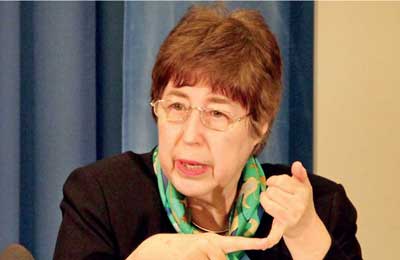Tuesday Feb 24, 2026
Tuesday Feb 24, 2026
Thursday, 17 November 2016 00:52 - - {{hitsCtrl.values.hits}}
 By Dharisha Bastians
By Dharisha Bastians
Sri Lanka faced a second stormy day of review before the UN Committee Against Torture (UNCAT) in Geneva yesterday, when independent experts on the committee demanded answers from a senior police official on the Government delegation about controversial interrogation methods and torture during his time at the head of the CID at the end of the conflict.
Sri Lanka delivered its reply to the UN treaty body committee at the Palais Wilson in Geneva yesterday, explaining progress on several emblematic cases of rights violations including the Trinco-5 murders, the killing of 17 aid workers in Muttur and the Prageeth Ekneligoda disappearance case. In the Trinco-5 and the 17 ACF workers case, the Government delegation said that the CID had been unable to record statements from several witnesses who were living overseas.
Officials of the Attorney General’s Department on the delegation to UNCAT said that the Government was in the process of amending the Witness and Victim Protection Act to make video evidence provided from overseas admissible as evidence.
The Government also informed the UNCAT that there were no more suspects being held under the Prevention of Terrorism Act without charges being filed.
The Government also responded to UNCAT concerns raised on Tuesday about vetting processes in place for military personnel being deployed on UN peace keeping missions, saying a “stringent” three tier internal and external vetting process had been put in place by the Government, in consultation and cooperation with the UN. Sri Lanka’s Deputy Permanent Representative to the UN in Geneva, Samantha Jayasuriya said there was an internal vetting process by the military, police and intelligence for personnel being considered for service in UN peacekeeping operations, and an external vetting process by the Human Rights Commission of Sri Lanka. “On completion of these internal and external processes, names are submitted to the UN Department on Peacekeeping Operations and subject to further vetting by the Office of the High Commissioner for Human Rights (OHCHR),” Deputy Permanent Representative Jayasuriya reported.
But the most controversial part of the session was after the Government concluded the first part of its submissions to the Committee, when UNCAT Member Felice Gaer, said the “internet had exploded” over allegations about National Intelligence Chief DIG Sisira Mendis who was a member of the Sri Lankan Government delegation. DIG Mendia, Gaer said, had been named in the OHCHR Investigation on Sri Lanka Report as being the head of the CID and the TID during the end of the conflict, a time when there were horrific allegations of torture and ill-treatment at detention centers and even the fourth floor of the Police Headquarters Colombo, the traditional offices of the CID.
“We have the opportunity to get a straight story from someone in authority during such a crucial time,” Gaer said, as she fired a string of questions for DIG Mendis on interrogation techniques, conditions at detention centers and the conduct of officials under his command.
Following the Government submissions, Gaer noted that the overarching concern was that while the delegation had elaborated on laws and procedures, it had failed to address many substantive allegations raised about abuses and how it is tackling the issue of impunity.
“Based on everything we have heard, the issue of impunity is hanging like a sword over your country, and indeed, over your review,” Gaer told the Lankan delegation during the review.
However, with limited time available as the end of the session was nearing, the Committee did not hear from DIG Mendis. “We regret that we were unable to hear from Mr Mendis,” said J Modvig, Chair of UNCAT as he closed the session last evening. “We had hoped for more replies, especially to unanswered questions,” the Chairperson said.
Sri Lanka’s policy and legal framework on the Counter Terrorism Act was an ‘evolving document’, a Government delegation told the Committee Against Torture in Geneva yesterday, responding to key concerns raised about the proposed legislation during the country review by the United Nations treaty body on Tuesday.
Output by the Government appointed drafting committee reflected a process of drafting new counter-terrorism legislation to replace the Prevention of Terrorism Act, senior members of the delegation told the Committee.
Addressing the UN Committee Against Torture (UNCAT) during its 59th session at the Palais Wilson in Geneva, Sri Lanka’s Permanent Representative to the UN in New York, Dr Rohan Perera who was also a member of the Government committee that drafted the proposed counter-terrorism policy, said he was confident that the final draft would address most concerns raised.
The counter-terrorism draft policy had been the subject of “intense deliberation” within the drafting committee itself, Ambassador Dr Perera noted, adding that there had been alternative views addressed in the committee about key concerns raised at UNCAT on Tuesday, including the scope of terrorism offences, access to a lawyer and period in detention before a detainee is produced before a magistrate.
“There is a need to recognize importance benchmarks set by UN conventions in defining the offences of terrorism,” Dr Perera observed, referring to sections of the draft policy that have come under the most criticism by human rights activists and lawyers in Sri Lanka and overseas.
Dr Perera said there were also salutary elements in the proposed counter-terrorism framework, including the notification of arrest to the Human Rights Commission of Sri Lanka (HRCSL) as sson as possible or within 24 hours, the ability of the magistrate to look into the wellbeing of a detainee and a magistrate’s power to direct a forensic examination of detainees for signs of mistreatment.
“We are confident that the outcome of the deliberations of the committee will find a delicate balance on all key issues,” Sri Lanka’s envoy to the UN in New York told the Committee. (DB)